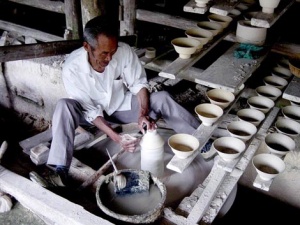“Jingde Town”的版本间的差异
来自China Digital Space
小 (文本替换 - 替换“Category”为“分类”) |
|||
| 第1行: | 第1行: | ||
| − | <h3>''Jǐngdé Zhèn'' 景德镇</h3> | + | <h3>''Jǐngdé Zhèn'' [[景德镇]]</h3> |
[[File:景德镇2.jpg|300px|thumb|right|''Making porcelain in Jingde. (Source: [http://scenery.cultural-china.com/en/130Scenery3135.html Cultural China])'']]Town in Jiangxi Province known as the porcelain capital of China; code name for China. | [[File:景德镇2.jpg|300px|thumb|right|''Making porcelain in Jingde. (Source: [http://scenery.cultural-china.com/en/130Scenery3135.html Cultural China])'']]Town in Jiangxi Province known as the porcelain capital of China; code name for China. | ||
2024年12月5日 (四) 02:52的最新版本
Jǐngdé Zhèn 景德镇

Town in Jiangxi Province known as the porcelain capital of China; code name for China.
When netizens write about China, the word "China" (Zhōngguó 中国) is often picked up by sophisticated Internet filters that look for sensitive words, also known as sensitive porcelain, and screen for political content. Since in English porcelain is also called "china," Jingde's name is used to get around internet censorship and keep talking about the country.
This innocuous sounding exchange has two entirely different meanings:
What kind of a place is Jingde?
景德镇是什么地方?
It's a small town that produces cups (bēijù 杯具) and dinnerware ('cānjù 餐具) daily.
天天生产杯具和餐具的小镇。
This can be read as:
What kind of a place is China?
It's a small town that produces tragedy (bēijù 悲剧) and misfortune (cǎnjù 惨剧) daily.
Amid a massive crackdown on Internet rumors in 2013, verbal play on the word "rumor̦̦" established residency in Jingde. The word for "rumor" (yáo 谣) sounds identical to "kiln" (yáo 窑), an essential instrument in the porcelain-making process. As central authorities used their crackdown on rumor-mongering to gain control of online public opinion by targeting many influential online personalities, netizens drew attention to many cases where public officials were responsible for spreading untruths. This underlined two types of rumors: "people's rumors" (mínyáo 民谣) and "official rumors" (guānyáo 官谣):
The kilns of Jingde Town produce sensitive porcelain. Some comes from people's kilns, and some comes from official kilns.
景德镇民窑出敏感瓷,有的出自民窑 ,有的出自官窑。
"Official kilns" are a reference to the state-owned kilns of China's dynastic period, many of which can be seen today at heritage sights in Jingde. By replacing the character for "kiln" with the homophonic character for "rumor," the sentence could be interpreted to mean "the rumor mills of Jingde Town make sensitive porcelain. Some come from rumors spread by the people, and some come from rumors spread by officials."




